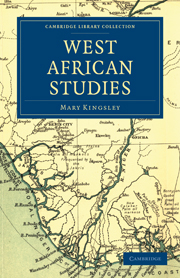Book contents
- Frontmatter
- PREFACE TO THE READER
- Contents
- LIST OF ILLUSTRATIONS
- CHAPTER I INTRODUCTORY
- CHAPTER II SIERRA LEONE AND ITS SURROUNDINGS
- CHAPTER III AFRICAN CHARACTERISTICS
- CHAPTER IV FISHING IN WEST AFRICA
- CHAPTER V FETISH
- CHAPTER VI SCHOOLS OF FETISH
- CHAPTER VII FETISH AND WITCHCRAFT
- CHAPTER VIII AFRICAN MEDICINE
- CHAPTER IX THE WITCH DOCTOR
- CHAPTER X EARLY TRADE IN WEST AFRICA
- CHAPTER XI FRENCH DISCOVERY OF WEST AFRICA
- CHAPTER XII COMMERCE IN WEST AFRICA
- CHAPTER XIII THE CROWN COLONY SYSTEM
- CHAPTER XIV THE CROWN COLONY SYSTEM IN WEST AFRICA
- CHAPTER XV MORE OF THE CROWN COLONY SYSTEM
- CHAPTER XVI THE CLASH OF CULTURES
- CHAPTER XVII AN ALTERNATIVE PLAN
- CHAPTER XVIII AFRICAN PROPERTY
- APPENDIX
- I A SHORT DESCRIPTION OF THE NATIVES OF THE NIGER COAST PROTECTORATE, WITH SOME ACCOUNT OF THEIR CUSTOMS, RELIGION, TRADE, ETC. BY M. LE COMTE C. N. DE CARDI
- II A VOYAGE TO THE AFRICAN OIL RIVERS TWENTY-FIVE YEARS AGO. BY JOHN HARFORD
- III TRADE GOODS USED IN THE EARLY TRADE WITH AFRICA AS GIVEN BY BARBOT AND OTHER WRITERS OF THE SEVENTEENTH CENTURY. BY M. H. KINGSLEY
- INDEX
- Plate section
I - A SHORT DESCRIPTION OF THE NATIVES OF THE NIGER COAST PROTECTORATE, WITH SOME ACCOUNT OF THEIR CUSTOMS, RELIGION, TRADE, ETC. BY M. LE COMTE C. N. DE CARDI
Published online by Cambridge University Press: 05 December 2011
- Frontmatter
- PREFACE TO THE READER
- Contents
- LIST OF ILLUSTRATIONS
- CHAPTER I INTRODUCTORY
- CHAPTER II SIERRA LEONE AND ITS SURROUNDINGS
- CHAPTER III AFRICAN CHARACTERISTICS
- CHAPTER IV FISHING IN WEST AFRICA
- CHAPTER V FETISH
- CHAPTER VI SCHOOLS OF FETISH
- CHAPTER VII FETISH AND WITCHCRAFT
- CHAPTER VIII AFRICAN MEDICINE
- CHAPTER IX THE WITCH DOCTOR
- CHAPTER X EARLY TRADE IN WEST AFRICA
- CHAPTER XI FRENCH DISCOVERY OF WEST AFRICA
- CHAPTER XII COMMERCE IN WEST AFRICA
- CHAPTER XIII THE CROWN COLONY SYSTEM
- CHAPTER XIV THE CROWN COLONY SYSTEM IN WEST AFRICA
- CHAPTER XV MORE OF THE CROWN COLONY SYSTEM
- CHAPTER XVI THE CLASH OF CULTURES
- CHAPTER XVII AN ALTERNATIVE PLAN
- CHAPTER XVIII AFRICAN PROPERTY
- APPENDIX
- I A SHORT DESCRIPTION OF THE NATIVES OF THE NIGER COAST PROTECTORATE, WITH SOME ACCOUNT OF THEIR CUSTOMS, RELIGION, TRADE, ETC. BY M. LE COMTE C. N. DE CARDI
- II A VOYAGE TO THE AFRICAN OIL RIVERS TWENTY-FIVE YEARS AGO. BY JOHN HARFORD
- III TRADE GOODS USED IN THE EARLY TRADE WITH AFRICA AS GIVEN BY BARBOT AND OTHER WRITERS OF THE SEVENTEENTH CENTURY. BY M. H. KINGSLEY
- INDEX
- Plate section
Summary
It is with some diffidence I attempt this task, because many more able men have written about this country, with whom occasionally I shall most likely be found not quite in accord; but if a long residence in and connection with a country entitles one to be heard, then I am fully qualified, for I first went to Western Africa in 1862, and my last voyage was in 1896.
Previous to 1891, the date at which this Coast (Benin to Old Calabar) was formed into a British Protectorate under the name of the Oil Rivers Protectorate, now the Niger Coast Protectorate, each of the rivers frequented by Europeans for the purpose of trade was ruled over more or less intelligently by one, and in some cases by two, sable potentates, who were responsible to Her Britannic Majesty's Consul for the safety and well-being of the white traders; also for the fostering of trade in the hinterlands of their district, for which good offices they were paid by the white traders a duty called “comey,” which amounted to about 2s. 6d. per ton on the palm oil exported. When the palm kernel trade commenced it was generally arranged that two tons of palm kernels should be counted to equal one ton of palm oil so far as regards fiscal arrangements. The day this duty was paid was looked upon by the king, or kings if there were two of them, as a festival; in earlier years a certain amount of ceremony was also observed.
- Type
- Chapter
- Information
- West African Studies , pp. 443 - 566Publisher: Cambridge University PressPrint publication year: 2010First published in: 1899



